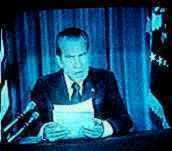Indians expanded presidential power
Executive OrderThe occupation of the BIA was the central drama in a trilogy of crises that affected American Indian affairs during Patterson’s four years in the Nixon White House. The first was the 1969 occupation of Alcatraz Island, an abandoned federal prison site in San Francisco Bay; the third was the 1973 standoff at Wounded Knee on South Dakota’s Pine Ridge reservation. All ended peacefully. For Patterson, who played a leading role in the government’s response, these events stand out as high points in a public-service career going from the Franklin D. Roosevelt administration through the Gerald R. Ford White House. They also illustrate what Patterson terms a profound shift in United States government since the Second World War: the movement of policy making and execution away from the traditional executive-branch departments—Interior, State, Labor, and the others—to the White House and the president’s staff. It was Patterson and his boss, Leonard Garment, who coordinated the government’s response to the three American Indian crises of the Nixon years, not officials of the Interior Department and its Bureau of Indian Affairs.
The shift is part of an ongoing centralization of executive power that has weakened the departments and strengthened the presidency. It has given birth to a new kind of public administration that, Patterson believes, can respond better to the complexity of the modern world—and to such crises as the 1972 BIA occupation.


No comments:
Post a Comment